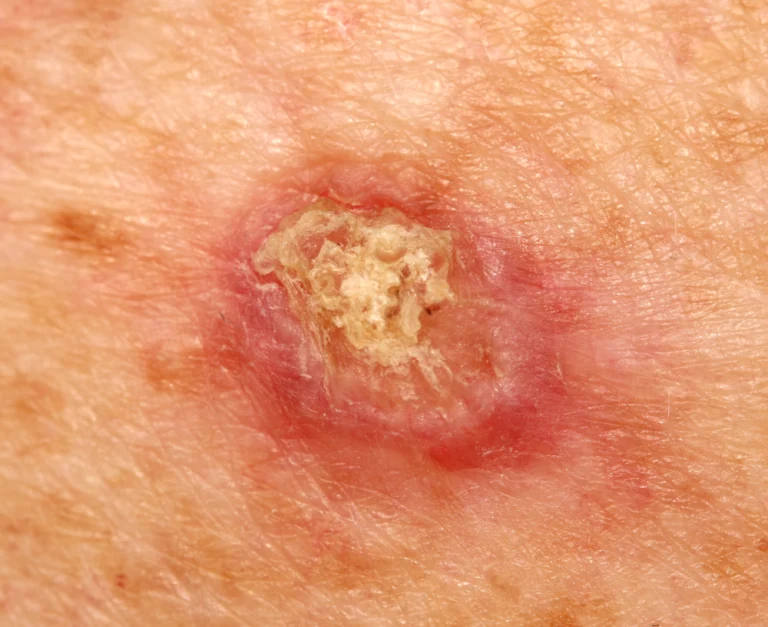Squamous cell skin cancers are commonly found on sun exposed skin. Fortunately, they are easily treated when identified early. Unfortunately, delays are relatively common with the long waits for dermatology appointments and delays in treatment can result in progression. Now, you can say goodbye to the overwhelming frustration and anxiety caused by months-long waiting periods for appointments. The Trillium Clinic is proudly redefining the dermatologic care model, ensuring that every patient will be seen within 14 days of requesting an appointment. Step into a new era of patient-centered care, where the agony of waiting for appointments becomes a thing of the past.
What is a Squamous Cell Cancer

Squamous cell carcinoma usually appears as a red, scaly patch or bump on the skin. It may have a rough or crusted surface and can be tender or painful. The lesion may grow over time and may bleed or develop an ulcer. While it can occur anywhere on the body, it is most commonly found on sun-exposed areas like the face, ears, lips, neck, scalp, arms, and hands.
What causes a Squamous Cell Cancer
The primary cause of squamous cell carcinoma is long-term exposure to ultraviolet (UV) radiation from the sun or artificial sources like tanning beds. Other risk factors include:
Fair skin: People with fair or light-colored skin are more susceptible to developing squamous cell carcinoma.
Chronic sun exposure: Spending significant time outdoors, especially without adequate sun protection, increases the risk.
Age: Squamous cell carcinoma is more common in older individuals, as cumulative sun exposure takes its toll on the skin over time.
Weakened immune system: People with weakened immune systems, such as those with HIV/AIDS or undergoing organ transplantation, have an increased risk.
Chronic Lymphocytic Leukemia (CLL): CLL is a type of cancer that affects the blood and bone marrow. It is characterized by the overproduction of abnormal lymphocytes, a type of white blood cell. CLL usually progresses slowly and may not cause noticeable symptoms in its early stages. Common symptoms include fatigue, enlarged lymph nodes, weight loss, night sweats, and frequent infections. Individuals with CLL are at a higher risk for developing multiple, larger and invasive squamous cell carcinomas.
How are Squamous Cell Cancers Treated
Treatment for squamous cell carcinoma depends on various factors, including the size, location, and stage of the cancer. Common treatment options include:
Surgical excision: The primary treatment for localized squamous cell carcinoma involves surgically removing the cancerous tissue along with a margin of healthy skin.
Mohs surgery: This specialized surgical technique is used for larger or high-risk tumors. It involves removing the cancer layer by layer, examining it under a microscope during the procedure to ensure complete removal while preserving healthy tissue.
Electrodessication and curettage: The tumor is scraped off with a sharp instrument (curette), and then an electric current is applied to the area to control bleeding and destroy any remaining cancer cells.
Radiation therapy: High-energy beams are directed at the tumor to kill cancer cells and shrink the lesion. It is commonly used when surgery is not suitable or for tumors in sensitive areas.
Immunotherapy: In advanced cases or for high-risk tumors, medications that boost the immune system’s ability to recognize and attack cancer cells may be used.
Can Squamous Cell Carcinoma be prevented
To reduce the risk of squamous cell carcinoma and other skin cancers, it is important to:
Limit sun exposure: Seek shade, especially during peak sun hours, and wear protective clothing, hats, and sunglasses.
Apply sunscreen: Use a broad-spectrum sunscreen with a high SPF on exposed skin, even on cloudy days.
Avoid tanning beds: Tanning beds emit harmful UV radiation and increase the risk of skin damage and skin cancer.
Embark on your journey
Regular skin examinations and follow-ups with a dermatologist are recommended for individuals with a history of squamous cell cancer to monitor for any changes or new lesions. Early detection and treatment is crucial to prevent the evolution or metastatic spread of these lesions. You should schedule annual skin checks if you are low risk, and more frequent total body skin examinations if you have a history of actinic keratoses or other skin cancers.
As experts in the detection and treatment of skin cancer, we invite patients from Chapel Hill, Carrboro, Hillsborough, Pittsboro, Mebane, Durham, Burlington, Cary, Holly Springs, Raleigh and surrounding cities, to schedule their total body skin examination with us today.
You can self-schedule here or contact us by phone and we will help you find a convenient appointment. Once you arrive, a member of our dermatology team will conduct a comprehensive evaluation of your skin and discuss any findings that may be concerning. Skin cancers can be treated effectively when identified early. Do not put off your annual skin exam any longer!

